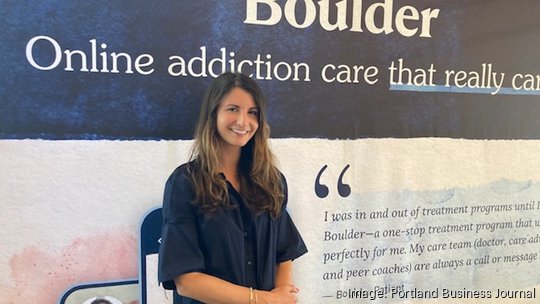
When Stephanie Strong founded Boulder Care in 2017, neither buprenorphine nor telemedicine were as accepted as they are today.
The medication is considered the gold standard in treatment for opioid use disorder, yet restrictions around prescribing buprenorphine limited access, especially for those lacking stable housing or transportation.
Portland-based Boulder has used telemedicine, which gained a big foothold during the Covid pandemic, to bring the medication-assisted treatment to 13,000 patients struggling with opioid use disorder in Oregon, Washington and Ohio who may not otherwise have been able to benefit from the treatment.
We caught up with Strong at Boulder’s offices in a historic building on Naito Parkway, along the Portland waterfront, months after the company completed a $35 million Series C investment round, bringing to $85 million the amount raised since Boulder’s inception. Boulder now has 160 employees, about half of whom are involved in direct patient care, and plans to expand to seven more states in the next three years.
Here are a few excerpts from the conversation:
On the investment environment
“All of 2023 was spent preparing for going out to market, knowing it was a punishing environment for health care startups,” Strong said. “We were thrilled to have a successful round. The team is feeling really energized and excited about growing and building on the model we’ve optimized in three states.”
It helped that Boulder now has a proven track record of getting medication assisted therapy to patients without compromising quality or safety, she said.
“We were very focused on proving out the model and showing we have a path to profitability and a high-quality program,” Strong said. “It paid off in the round. We had a competitive process and multiple investors who wanted to come in. One thing that was striking about the round compared to 2020 is investors were focusing on quality and outcomes. Before, it was, 'How fast are you growing?' Investors said, ‘You’re the only providers who led with outcome and have research to back it up.'”
On Boulder’s expansion to Ohio and beyond
Much of its growth has been through Medicaid plans. Half the Boulder team is now in Ohio and the plan is to expand next into Michigan and North Carolina.
“It’s a pretty methodical build,” Strong said. “The goal is to put roots down in the community. We really like to have people on the ground who can build links to in-person care, so it’s a little slower but results in higher quality and a better reputation when you’re known and not an impersonal technology.”
Boulder is also doing some specialized program development, including an adolescent program launched earlier this year in Washington and one planned for prisoners in Josephine and Jackson counties.
Patients are finding their way to Boulder largely through word of mouth, she said.
“You go to Ohio and there are very few (addiction treatment) options and those that do exist are challenging,” Strong said. “Word gets out that you can get buprenorphine in 30 minutes and get a peer recovery coach.”
On Measure 110
Boulder received a $917,300 grant to expand medication assisted treatment to rural Oregon. The company is using the grant, in part, to hand out cell phones at a Walmart in southern Oregon, so people can access services.
Measure 110 decriminalized possession of small amounts of street drugs and was blamed for an increase in overdose deaths and other ills. But Strong said the measure, which also directed $300 million to low-barrier treatment and supportive housing, came about just as the Covid pandemic and fentanyl were exploding.
“There was a lot of blowback on Measure 110 that didn’t give us the full amount of time to see it out and its potential,” she said. “A bunch of things were happening at once. It’s so hard to measure when there are so many variables. I wish it was less politically charged and about pragmatic solutions and ways to help our neighbors.”



